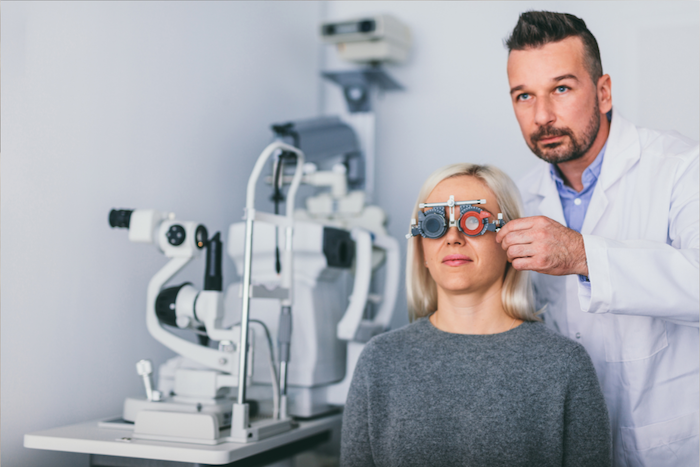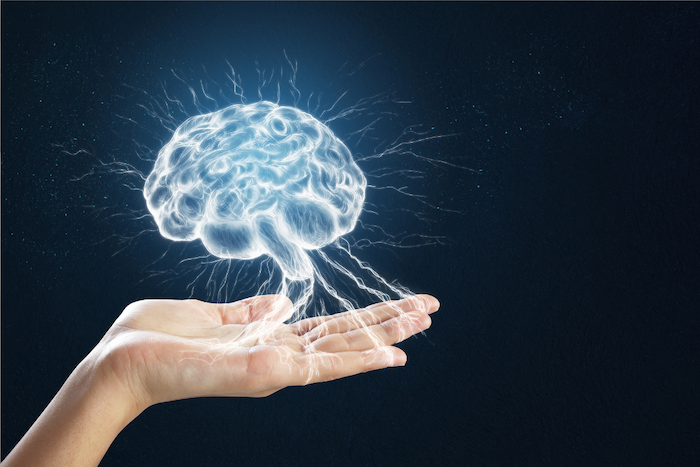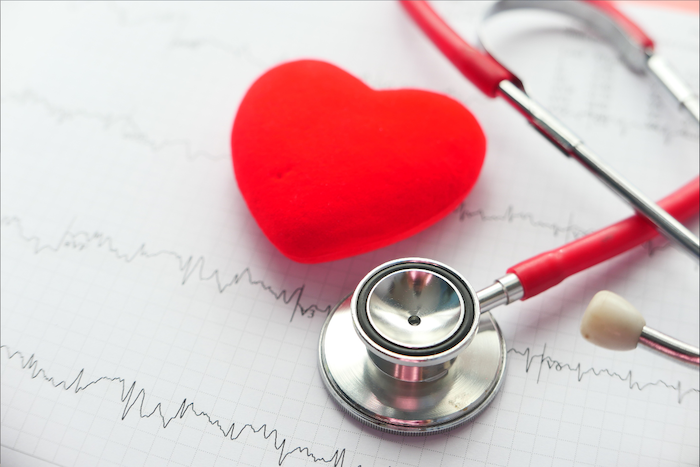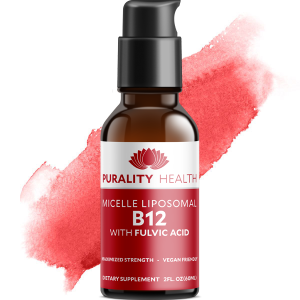 Vitamin B12 – or cobalamin – is what’s called an essential nutrient, as your body cannot produce it on its own.
Vitamin B12 – or cobalamin – is what’s called an essential nutrient, as your body cannot produce it on its own.
It’s found mostly in animal products but is often fortified in foods to help lower rates of deficiency. Even still, researchers estimate that over 40% of American adults are deficient in this crucial vitamin. [1]
But when it comes to a B12 deficiency, women are more likely to be deficient than men, with some researchers calling “vitamin B12 deficiency a global health issue among women…” [2]
This can have major implications for a woman’s health. In today’s blog, we go over nine benefits women may be missing if they’re low in this crucial nutrient.
1. Red Blood Cell Formation And Anemia
Healthy red blood cells are small and round. However, when a vitamin B12 deficiency occurs, red blood cells can become large and oval. Due to this irregular shape, the red blood cells are unable to flow as freely and efficiently as needed. This leads to megaloblastic anemia, a condition where the body doesn’t have enough red blood cells to carry oxygen throughout the body. [3]
According to the World Health Organization (WHO), 30% of women are anemic, meaning their bodies aren’t getting enough oxygen through the blood supply. Symptoms of anemia include weakness, fatigue, and light-headedness. [4]
The research on this is clear and well-accepted within the scientific community. Your body needs vitamin B12 to make red blood cells and keep them healthy. Otherwise, vitamin B12 deficiency anemia may develop. [5]
2. A Healthy Pregnancy
 Research suggests that vitamin B12 may help reduce the risk of birth defects.
Research suggests that vitamin B12 may help reduce the risk of birth defects.
Sufficient B12 levels are needed for the brain and the nervous system of a fetus during development in the womb. Low levels of vitamin B12 in the earliest stages of pregnancy can increase the risk of birth defects, such as neural tube defects, as well as premature birth or miscarriage. [6]
One study compared B12 levels in pregnant women. It was found that women with low levels of vitamin B12 were three times as likely to give birth to a child with defects compared to those with adequate levels.
When comparing those with severely low levels to those with high levels, the risk went up to five times. [7]
3. Supports Bone Health
Osteoporosis – a condition characterized by a loss of bone mass – occurs at high rates amongst older women, even if they’ve never shown any underlying risk factors. [8]
Research also shows that maintaining B12 levels can contribute to healthy bones and even ward off certain deteriorating bone conditions.
A study of more than 2,500 participants found that those with low vitamin B12 levels also had lower levels of bone mineral density. [9]
Low levels of bone mineral density can lead to bones becoming weak and fragile, causing bones to degrade.
Many studies support the notion that a lack of vitamin B12 is linked to poor bone health and a higher risk of bone degradation. [10, 11, 12]
4. Supports Eye Health
 Experts warn that women need to pay extra attention to eye health. This is for several reasons, including the fact that women live longer, putting them at higher risk of eye diseases like macular degeneration; women are more likely to suffer from autoimmune disorders, which often come with visual side effects; and normal age-related hormonal changes tend to affect women’s eyes. [13]
Experts warn that women need to pay extra attention to eye health. This is for several reasons, including the fact that women live longer, putting them at higher risk of eye diseases like macular degeneration; women are more likely to suffer from autoimmune disorders, which often come with visual side effects; and normal age-related hormonal changes tend to affect women’s eyes. [13]
Thankfully, vitamin B12 can help support the health of women’s eyes in a major way – by lowering the risk of macular degeneration. This is an age-related condition in the eye that mainly affects central vision.
Homocysteine is an amino acid found in the bloodstream. It’s been linked to macular degeneration. Researchers believe that regular supplementation of vitamin B12 can lower levels of homocysteine and help ward off the onset of macular degeneration. [14, 15, 16]
One study with 5,000 women over the age of 40 found that supplementing vitamin B12 may reduce the risk of macular degeneration. Researchers monitored the health of a group regularly supplementing with B12, along with a placebo group, for seven years. Cases of macular degeneration were 41% lower in the B12 group. [17]
5. Improves Mood
Premenopausal women are the group most affected by major depression. In fact, their risk is twice as high as it is for men. [18]
Although the way vitamin B12 affects mood is not fully understood yet, researchers are aware of a few key facts.
Vitamin B12 plays a critical role in synthesizing and metabolizing serotonin, a chemical that regulates mood. As a result, a deficiency in the vitamin may lead to lower levels of serotonin, resulting in low mood and possibly even psychiatric conditions. [19]
Studies have demonstrated the ability cobalamin may have when it comes to improving mood and well-being.
One study that looked at those with both low mood and low vitamin B12 levels found that adding vitamin B12 supplementation to a well-being regimen improved mood better than it did if the vitamin B12 was excluded. [20]
Another study found that a vitamin B12 deficiency doubled the risk of poor moods. [21]
On top of that, high vitamin B12 levels have been associated with a better chance of successful treatment of mood disorders. [22]
6. Supports Brain Health
 Unfortunately, women are also at a higher risk of developing dementia. Around twice as many women have Alzheimer’s disease – the most common type of dementia – compared to men. But once again, vitamin B12 can help. [23]
Unfortunately, women are also at a higher risk of developing dementia. Around twice as many women have Alzheimer’s disease – the most common type of dementia – compared to men. But once again, vitamin B12 can help. [23]
Brain atrophy is the loss of neurons in the brain, a process that commonly leads to cognitive decline. Adequate levels of vitamin B12 may be able to slow this process down, as well as help prevent memory loss, brain fog, and other similar ailments. [24]
One study looked at participants in the early stages of cognitive decline and found that a supplementation routine of vitamin B12 (and omega-3 fatty acid) helped slow down its development. [25]
Another study found that even just slightly lower levels of the vitamin than considered normal contributed to poor memory performance. [26]
7. Energy Levels
Many women may feel fatigued due to their menstrual cycle, low iron levels, or – as discussed above – anemia. But it could also be related to B12 levels.
One of the most common and earliest signs of a vitamin B12 deficiency is low energy levels. If you’re tired no matter how much you sleep, drink, or eat, then it may be related to your vitamin B12 levels. [27]
All of the B vitamins contribute to converting food into energy. [28]
However, vitamin B12 isn’t like coffee or an energy drink. It doesn’t provide a certain level of energy for a period of time.
Instead, low vitamin B12 levels can cause chronic fatigue, lowering your energy all of the time. So, maintaining levels of this crucial nutrient can help prevent low energy levels so that you can get on with your day. [23]
8. Supports Heart Health
 Heart disease is the leading cause of death for women. About 80% of women aged 40 to 60 have one or more risk factors for coronary heart disease. But unfortunately, the data shows that women are undertreated for heart issues. That means if you’re a woman, the responsibility for your heart falls on you more than it should. [29]
Heart disease is the leading cause of death for women. About 80% of women aged 40 to 60 have one or more risk factors for coronary heart disease. But unfortunately, the data shows that women are undertreated for heart issues. That means if you’re a woman, the responsibility for your heart falls on you more than it should. [29]
Homocysteine – the amino acid mentioned above – can do more than impact the health of your eyes. High levels of homocysteine have also been linked to poor heart health.
Studies have shown that because vitamin B12 can lower levels of this amino acid, it can reduce the risk of heart issues. [30, 31, 32, 33]
9. Health Of Skin, Hair, And Nails
Vitamin B12 plays a role in cell production. As such, it’s an important nutrient for the health of your skin, hair, and nails.
Low levels of vitamin B12 have been linked to hyperpigmentation, nail discoloration, hair changes, vitiligo, and angular stomatitis. [34, 35]
Studies have shown that supplementing with vitamin B12 can improve the health of the skin in those with low levels of the vitamin. [36, 37]
A vitamin B12 deficiency has been associated with graying hair, along with hair loss. Because the nutrient helps provide oxygen to the body, rich vitamin B12 levels may help provide hair follicles with what they need to grow strong, thick hair. [38]
Are You Getting Enough Vitamin B12?
 As you can see, vitamin B12 is super important for women’s health and well-being. But far too many women are going without.
As you can see, vitamin B12 is super important for women’s health and well-being. But far too many women are going without.
As we get older, it becomes more and more difficult for our bodies to absorb vitamin B12. [39]
That means that the older you are…
The more at risk you are for a deficiency.
Purality Health’s Micelle Liposomal Vitamin B12 is designed to be absorbed and used by your body.
Make sure you’re getting enough of this crucial vitamin.
>>> Click here to see the vitamin B12 deficiency symptom checklist.
Do you have any?
References And Resources
- https://www.mcgill.ca/oss/article/health-nutrition/should-you-be-worried-about-vitamin-b12-deficiency
- https://www.ncbi.nlm.nih.gov/pmc/articles/PMC7792587/
- https://www.hopkinsmedicine.org/health/conditions-and-diseases/vitamin-b12-deficiency-anemia
- https://www.who.int/news-room/fact-sheets/detail/anaemia#:~:text=Globally%2C%20it%20is%20estimated%20that,age%20are%20affected%20by%20anaemia.
- https://medlineplus.gov/ency/article/000574.htm
- https://pubmed.ncbi.nlm.nih.gov/18709885/
- https://www.ncbi.nlm.nih.gov/pmc/articles/PMC4161975/
- https://www.ncbi.nlm.nih.gov/books/NBK559156/
- https://www.sciencedaily.com/releases/2005/04/050421235233.htm
- https://pubmed.ncbi.nlm.nih.gov/15001613/
- https://pubmed.ncbi.nlm.nih.gov/19151987/
- https://pubmed.ncbi.nlm.nih.gov/12612156/
- https://healthcare.utah.edu/healthfeed/2023/04/why-women-need-pay-extra-attention-eye-health
- https://pubmed.ncbi.nlm.nih.gov/16387004/
- https://www.ncbi.nlm.nih.gov/pmc/articles/PMC4508850/
- https://www.health.harvard.edu/staying-healthy/In_brief_B_vitamins_and_homocysteine
- https://www.ncbi.nlm.nih.gov/pmc/articles/PMC2648137/
- https://www.hopkinsmedicine.org/health/wellness-and-prevention/recognizing-and-getting-help-for-mood-disorders#:~:text=Types%20of%20Mood%20Disorders,-There%20are%20several&text=Premenopausal%20women%20are%20the%20group,to%2010%20percent%20of%20men.
- https://www.ncbi.nlm.nih.gov/pmc/articles/PMC3271502/
- https://www.ncbi.nlm.nih.gov/pmc/articles/PMC3856388/
- https://pubmed.ncbi.nlm.nih.gov/10784463/
- https://pubmed.ncbi.nlm.nih.gov/14641930/
- https://www.alzheimers.org.uk/blog/why-dementia-different-women#:~:text=Women%20have%20a%20greater%20risk,risk%20factor%20for%20this%20disease.
- https://www.ncbi.nlm.nih.gov/pmc/articles/PMC3179651/
- https://www.ncbi.nlm.nih.gov/pmc/articles/PMC4927899/
- https://pubmed.ncbi.nlm.nih.gov/26912492/
- https://www.ncbi.nlm.nih.gov/pmc/articles/PMC7019700/
- https://www.ncbi.nlm.nih.gov/pmc/articles/PMC3257642/
- https://www.nhlbi.nih.gov/health/coronary-heart-disease/women
- https://pubmed.ncbi.nlm.nih.gov/22276208/
- https://www.ncbi.nlm.nih.gov/pmc/articles/PMC3326240/
- https://www.ncbi.nlm.nih.gov/pmc/articles/PMC5382296/
- https://pubmed.ncbi.nlm.nih.gov/25147783/
- https://www.ucsf.edu/news/2001/08/97362/folic-acid-vitamin-b12-show-potential-heart-disease-treatments
- https://www.ncbi.nlm.nih.gov/pmc/articles/PMC2965901/
- https://pubmed.ncbi.nlm.nih.gov/25559140/
- https://www.ncbi.nlm.nih.gov/pmc/articles/PMC2294086/
- https://pubmed.ncbi.nlm.nih.gov/3740873/
- https://www.ncbi.nlm.nih.gov/pmc/articles/PMC6380979/
- https://www.ncbi.nlm.nih.gov/pmc/articles/PMC5130103/
